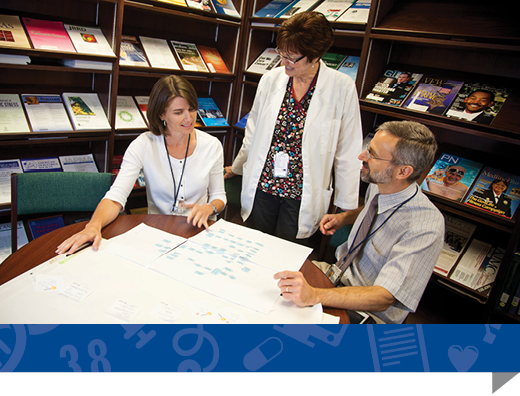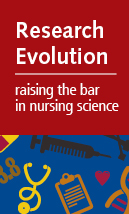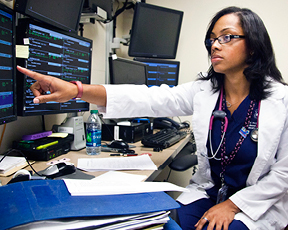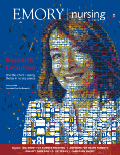The Quality Connection

Ingrid Duva (left), Corrine Abraham, and Michael Saenger are the first fellows in a program that engages nurses and physicians in quality improvement research at the Atlanta VAMC.
By Sylvia Wrobel
VA fellows improve health services for U.S. veterans
|
|
A few years ago, Emory built a pedestrian bridge to join its campus with that of the Atlanta Veterans Affairs Medical Center (VAMC), a university partner for more than 60 years. In 2012, those ties grew stronger with the launch of the National VA Quality Scholars Advanced Fellowship program at the Atlanta VAMC by Emory nursing and medical faculty.
Now one of eight programs nationwide, the program trains leaders who can develop new knowledge, or innovative applications of existing knowledge, to improve health care services for U.S. veterans.
When the U.S. Department of Veterans Affairs (VA) decided to expand the fellowship program from six to eight sites, Bethany Robertson DNP CNM of the School of Nursing and Anne Tomolo MD MPH of the School of Medicine jumped at the chance to make Atlanta one of the new locations. Thanks to their efforts, the first cohort of fellows—two faculty members in nursing and one in medicine—began a two-year immersion into the world of quality improvement at VAMC this past summer.
Quality improvement, a key driver of health care today, encompasses effectiveness, efficiency, safety, and value of health care delivery processes and systems. "The more quality improvement leaders we can prepare," says Robertson, "the more quickly we can fix some of the issues that plague our health care systems." Both she and Tomolo believe that when it comes to creating those leaders, the fellowship program is out in front on two important counts—training focused on research and training across disciplines.
Fellows first learn how the multiple cogs in health delivery systems work, then acquire the research methodology to identify a problem (a high infection rate, for example). They learn to design solutions and evaluate them in practice with the same rigor as in a clinical trial for a new drug or treatment. Fellows also study implementation science, promoting the timely uptake of positive research findings in clinical and community settings and at the policy level. Timeliness is especially important, notes Carolyn Clevenger 02MN DNP RN, clinical assistant professor of nursing and associate director of the fellowship program at the Atlanta VAMC. On average, research findings take 17 years to be implemented widely in clinical practice.
The VA Quality Scholars Advanced Fellowship program is one of a few that insist on training nurses and physicians side by side. The payoff is immediate, as fellows share their perspectives on their "homework" projects, seeing things neither one might have seen alone. Even more valuable, Robertson and Tomolo note, is building the capacity of physicians and nurses to work together to enhance health systems through quality improvement.
Most fellows in the program are well established in their careers. A nurse since 1991, Ingrid Duva 94N 10PhD joined the Emory nursing faculty after completing her doctorate. She is a health systems researcher with a special interest in care coordination between nurses and other members of the health care team. Emory internist Michael Saenger MD, who has been in practice at Grady Memorial Hospital since 1996, has a special interest in improving chronic pain management. Corrine Abraham RN MN, a School of Nursing instructor who will receive her DNP in December, has been a nurse for 30 years.
"It's amazing what the three of us learned in the first weeks alone," she says, "and my respect for the VA population and the VA health system continues to grow."
Once fellows complete the program, they often make quality improvement a major focus of their professional lives. Tomolo is an excellent example. One of the first to complete the fellowship program in Cleveland in 2000, she now serves as the Atlanta VAMC's chief of quality medicine. She also teaches and sees patients.
From the start, fellows at all eight sites share a global VA curriculum, delivered by interactive video and supplemented by national meetings. The local curriculum, developed by Robertson and Tomolo, takes advantage of resources at the Atlanta VAMC, Emory, Georgia Institute of Technology, Morehouse School of Medicine, and WellStar Health System. Some projects involve all three fellows, beginning with an analysis of the discharge process at VAMC and identifying possible quality and safety improvements. Later in the year, the fellows will help evaluate Emory's biannual Interprofessional Team Training Day, which brings nursing, medical, physician assistant, physical therapy, and medical imaging students together to learn team communication skills and how teamwork affects patient safety and quality of care.
Fellows may match part of the local curriculum with their interests. Some may sign up for the VA's online analytics course to become certified in outcomes data management. Others may opt to learn how quality improvement is practiced in WellStar's community hospital environment. All are mentored by Tomolo and Robertson, who also serves as WellStar's chief learning officer. Fellows also will help teach the course in health care quality and patient safety in the MSN program.
That's only the beginning. Next year, another cohort of three nursing and medicine fellows will enter the fellowship program at the Atlanta VAMC. EN




